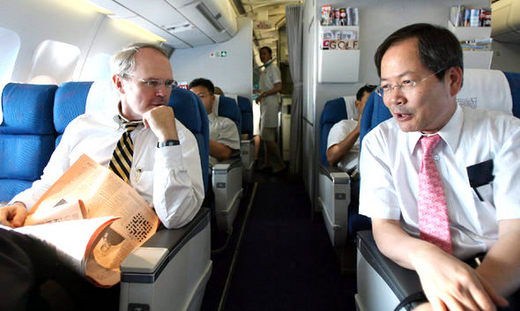 |
|
U.S. assistant secretary of state Christopher Hill talks to a Korean delegate to the six party talks on a flight bound for Kuala Lumpur on July 25.
|
U.S. assistant secretary of state to visit Japan, China, and South Korea
On Sunday, U.S. assistant secretary of state Christopher Hill will begin his tour to Japan, China, and Korea. Reuters, quoting an American official, said Hill will be calling for the three countries to cease all weapons-related trade with North Korea, as stipulated in a recent United Nations Security Council resolution. The official said Hill will also convey American support for the six-party talks outside of any pressure from the security council resolution. In addition to reiterating Washington’s current position, Hill will also reportedly talk about what to do regarding the possibility Pyongyang decides to test a nuclear device. On August 21, in a telephone between U.S. president George W. Bush and Chinese president Hu Jintao, following intelligence reports citing signs North Korea is preparing for a nuclear test, Bush asked Hu to use diplomatic pressure to encourage Pyongyang to come back to the six-party talks. Any diplomatic agreement between China and North Korea, including an invitation for North Korea’s National Defence Commission chairman Kim Jong-il to visit Beijing, would determine much of what Hill talks about while he is in China September 5-10, and when he arrives in Seoul after that. Observers in Beijing say that when China’s new ambassador to North Korea arrives in Pyongyang next week, he may carry with him an official invitation from Hu. But, as warned in a recent report by the International Crisis Group (ICG), the six-party talks risk becoming a "dead man walking." China will have a hard time convincing North Korea to come back to the talks unless there is a change in American policy, because, as noted in a North Korean foreign ministry statement on August 26, Pyongyang first wants to see an end to financial sanctions. The ICG report says that it could be a death sentence for the six-party talks should the U.S. attempt to win concessions from North Korea through financial sanctions and by pressuring it on human rights issues while simultaneously refusing to engage in bilateral dialogue. Chun Young-woo, South Korea’s chief delegate to the talks, said Sunday that the North Korean nuclear issue "cannot be solved through sanctions alone. The [South] Korean government’s position is that there needs to be a corresponding diplomatic effort" simultaneous with the sanctions, he said.





